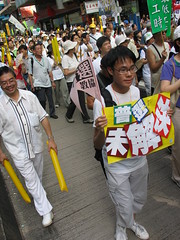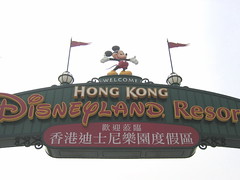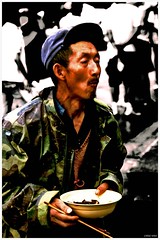Taming the Civil Society

While Taiwan and Thailand are undergoing political changes dramatically, everything seems to remain unchanged in Hong Kong. There is only one local news story attracts my attention: Some students of the University of Hong Kong (HKU) proposes to quit the Hong Kong Federation of Students (HKFS). This does not look like a big deal. But the term "passive revolution" might be an appropriate idea to understand what's happening in Hong Kong.
HKFS has been the representative body for student unions at seven universities and colleges since the late 1950s. Over the past few decades, it had been very politicized. During 1980s-1990s, HKFS was active in democratic movement, particularly in the incidents of June Fourth and fighting for revision of the Basic Law. In recent years, it has become less active but is still seen as a part of the pan-democratic alliance.
But now something different has happened in some university student unions. Chan Chi-kin, the former president of HKU students' union, and some students have launched a signature campaign to push a referendum to decide whether its student union should continue to join HKFS. This challenges the leadership of HKFS in local university students.
Chan criticized HKFS as an organization without a system of checks and balances and he was not happy about a large part of funding being allocated to the Social Movement Resource Centre, a group concerning social activism. He accused Lo Wai Ming, HKFS's former secretariat, of taking control over the financial resources of the federation.
But some were skeptical of Chan's political stances. Last year, before the July 1 rally, HKU student union released a statement which aroused controversies. It said, "Universal suffrage is not the solution to everything. Pursuing it blindly will lead to negative consequences. Cultivating good citizen quality and social environment congenial to universal suffrage is more meaningful than chanting slogans and taking to the street." A group of HKU alumni condemned this statement as discouraging people from joining the mass rally.
Now the signature campaign coincides with another incident. In mid-August, Lau Fong, president of HKU student union, and some student representatives went to meet Chief Executive of Hong Kong SAR government Donald Tsang. But this meeting was boycotted by four student unions because they were told not to inform the media of it. Lau Fong's father, Lau Nai Keung, a pro-Beijing government politician and committee member of Political Consultation, was the "middleman" who helped organize this meeting.
Yet all of these might not be a well-organized plot or political repression. But it demonstrates the pro-Beijing government partisans have shifted their strategies from promoting "patriotism" to gaining support and consensus from the civic associations. The political struggles and conflicts occur in the most grassroot levels of the society.
Over the past few years, local activists have advocated the slogan of "civil society" which is a force fighting against the encroachment by the government. What Lau Nai Keung, the pro-Beijing ideologue, proposed is not a crackdown on the civil society by the state. Instead, as he said, the civil society is not necessarily anti-government and it could "co-exist" with government "peacefully". He is so smart in playing with words that he even suggested Hong Kong need more "political oppositions" which would cooperate with the government.
Hong Kong | Politics







